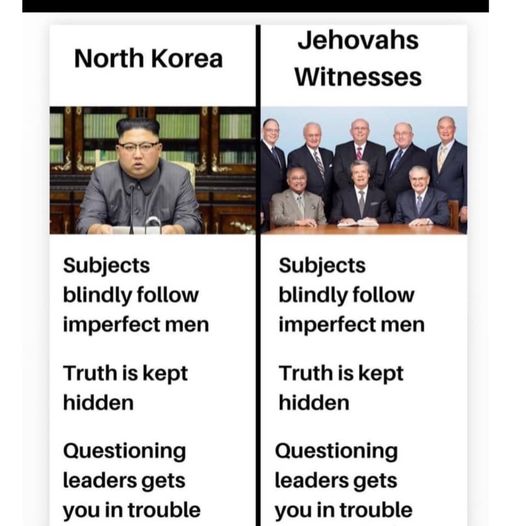In considering the intricate landscape of religious expression within totalitarian regimes, one may ponder a rather paradoxical question: Are there Jehovah’s Witnesses in North Korea? This inquiry provokes not just curiosity about the presence of a specific religious group but also prompts a deeper exploration into the philosophical and cultural ramifications associated with practicing faith in a repressive environment. The implications of such an exploration extend beyond mere enumeration; they invite a discourse on cultural relativism and the resilient nature of individual belief systems.
To navigate this complex issue, one must first understand the fundamental tenets of Jehovah’s Witnesses. This Christian denomination, with its roots in late 19th-century America, is distinguished by its advocacy of door-to-door evangelism, adherence to a strict interpretation of the Bible, and an unwavering commitment to neutrality in political matters. The central beliefs of Jehovah’s Witnesses underscore a collective identity rooted in community and faith, leading members to reject participation in secular government activities, including military service. Given this unique sociocultural identity, how do the principles of Jehovah’s Witnesses intersect with the authoritarian tapestry of North Korea, a nation renowned for its staunch anti-religion policy?
North Korea’s regime, led by Kim Jong-un, is notorious for its suppression of religious expressions that deviate from the state-sanctioned ideology, which venerates the ruling family akin to a quasi-religious belief system. The government maintains strict control over religious practice, permitting only state-approved organizations, such as the Korean Christian Federation, which operates under the guise of Christianity but practices a heavily altered form of faith that upholds the regime’s objectives. Consequently, any form of unsanctioned spiritual expression, including that which is espoused by Jehovah’s Witnesses, is met with severe ramifications.
Historically, Jehovah’s Witnesses have been persecuted for their beliefs in various geopolitical contexts. In countries such as Germany during the Nazi regime or the Soviet Union, members were often imprisoned, exiled, or executed for their refusal to conform to state ideologies. The same mechanisms of oppression are currently at play in North Korea, where reports of detainment, harassment, and torture of religious dissidents abound. Under these dire circumstances, one is compelled to consider how adherents of Jehovah’s Witnesses might survive, let alone thrive.
While official estimates suggest that there are no confirmed congregations of Jehovah’s Witnesses in North Korea due to the regime’s systematic repression, this does not eliminate the possibility of believers existing clandestinely. Faith, despite its apparently repressive surroundings, often finds a way to persist. Cognitive dissonance afflicts many who grapple with their identity in a society that demands unwavering loyalty to the state. It is plausible that some individuals have internalized the teachings of Jehovah’s Witnesses, engaging in private practice or communal worship in secrecy, shielded from the regime’s prying eyes.
With cultural relativism as a lens, one can juxtapose the experience of Jehovah’s Witnesses in North Korea against that of other religious groups. While the practice of faith is generally understood as an intrinsic human right, the North Korean context complicates matters. Cultural relativism posits that beliefs and practices should be understood in their own cultural context, yet this notion conflicts with universal assertions of human rights. The absurdity arises when one considers that the state, in deeming certain practices as unacceptable, essentially denies individuals the right to their own cultural identity. This poses the question: can a regime that thrives on oppression cultivate a truly cohesive national identity while simultaneously stifling the diverse expressions of its populace?
The predicament of Jehovah’s Witnesses in North Korea elucidates the broader complexities of religion and state interaction. Governments wield the power to shape the narrative surrounding faith, often seeking conformity to maintain control. However, the existence of unconfirmed reports of defiance by religious individuals highlights a human yearning for belonging and meaning that transcends political boundaries. Thus, while the question of whether there are Jehovah’s Witnesses in North Korea remains shrouded in uncertainty, what emerges is a compelling narrative about faith’s resilience.
Furthermore, both internal and external pressures shape the discourse surrounding religion in authoritarian contexts. The North Korean state’s hostility towards foreign religious influences exacerbates the challenge faced by Jehovah’s Witnesses. This hostility also extends to those who engage in proselytization, a fundamental practice of Jehovah’s Witnesses that is outright banned in North Korea. The subtle act of sharing one’s beliefs bears significant risk—not only for the individuals directly involved but also for familial relations and community dynamics.
In conclusion, navigating the question of whether Jehovah’s Witnesses exist within the closed borders of North Korea is like traversing an intricate labyrinth of ideology, personal conviction, and societal structure. While tangible evidence may elude the inquisitive observer, one must recognize that faith, by its very nature, often rebels against constraints. The resolute nature of belief and the quest for spiritual sustenance reveals profound insights into the human condition, transcending the barriers imposed by authoritarian regimes. As such, whether one identifies as a Jehovah’s Witness in North Korea or elsewhere, the fundamental aspiration for faith endures, albeit whispered from the shadows and obscured behind walls of oppression.
